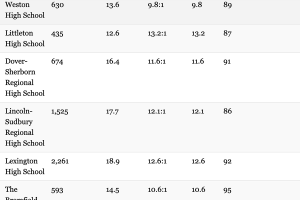City Councilors Criticize Changes to Boston Public School Start Times
Tito Jackson and Matt O'Malley join elementary school parents in speaking out against BPS' new schedules.

Photo via iStock.com/billnoll
Though Boston Public Schools’ updated start times may be a boon for teens seeking a few more minutes of sleep, some elementary school parents are unhappy with the new equilibrium.
Last week, BPS announced that, after 18 months of community conversations and MIT-conducted research, 105 of the city’s 125 schools will have new bell times at the start of the 2018-19 school year. Based on a canon of scientific research showing teens reap academic and health benefits from getting more sleep, the changes will result in 94 percent of secondary students starting class after 8 a.m. next year. But like a seesaw reorienting itself, younger students will disproportionately take the brunt of earlier alarms.
Though just 15 percent of elementary schools will end after 4 p.m. next year—down from 33 percent—as a result of the new schedules, some young students will have to be in class as early as 7:15 a.m come September. Parents say this new normal (which in some areas will result in more than a two-hour change and 1:15 p.m. dismissal) will throw their families’ transit and after-school care out of whack. In response, as of Monday morning, more than 5,300 people have signed an online petition asking Mayor Marty Walsh and Superintendent Tommy Chang to cancel the updates.
The petition’s author, Jane Miller, wrote that the district’s focus on optimizing bus schedules and costs, rather than student learning, is misguided: “We are asking that changes like this be made based on community input and not an MIT algorithm and that the education of our children be based on what is healthy for them, not what is healthy for the bus budget.”
City Councilor Tito Jackson was sympathetic to the parents of young children, tweeting that the decision to start schools at 7:15 a.m. “shows a complete tone deafness to the needs, jobs and schedules” of working families.
As Chair of Education, I agree post 8am start times for high school students are the right move. A K-8 change to a 7:15am-1:15pm school day shows a complete tone deafness to the needs, jobs & schedules of the working families that u serve. #Listen+Hit the brakes now! #bospoli
— Tito Jackson (@titojackson) December 9, 2017
City Councilor Matt O’Malley echoed Jackson’s statements. He wrote on Twitter that though the district should be applauded for keeping high schoolers’ needs in mind, other families shouldn’t be penalized in exchange.
Later High School start times are a laudable goal that we should embrace, but not at the expense of a way too early elementary school schedule. 7:15a-1:15p is very difficult for most families & @BostonSchools should come up with a revised compromise schedule. https://t.co/QyBgbQgwS1
— Matt O’Malley (@MattOMalley) December 9, 2017
In response to the criticism, Chang emphasized the scientific research backing the changes as well as the robust interviews conducted with community members prior to the announcement: “We believe that the new times will better serve students and be reflective of the feedback we’ve heard during our robust community engagement process, as well as reflect the new School Committee policy,” he said in a statement to the Boston Globe.

